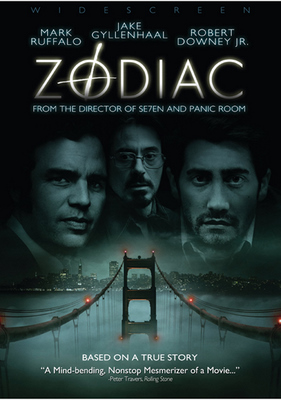

Zodiac is an intensely captivating taut thriller from David Fincher (
Se7en,
Panic Room). Based on the book by Robert Graysmith, it presents a fictionalized account of the manhunt for the serial killer who terrorized San Francisco in the 1960s and 1970s. More than this, it provides a mesmerizing study of obsession and its consequences.
The movie opens with a young couple going out to a lover's lane area. When a car stops behind them, they are afraid but it turns out to be other punk kids having a little fun with them. When another vehicle, looking like a police car, stops behind them, they are spooked but it drives off. When it returns, and the man gets out, they are relieved to speak to a policeman . . . but only momentarily. This is a killer. And he kills the woman, leaving the man wounded but not dead. Apart from this violence, and two other brief killing scenes, the film is more psychologically frightening than violent.
When a later is sent to three San Francisco newspapers claiming credit for a later murder as well as this and another, the editors and police are unsure whether to believe the writer or not. But there are enough details known only to the police to make this credible. Along with the letter is a page written in code claiming to give the identity of the killer. This is the beginning of the hunt for the serial killer who was known as the Zodiac, after the use of this symbol in this code.

Present at this first meeting is reporter Paul Avery (Robert Downey Jr) and Robert Graysmith (Jake Gyllenhaal), a cartoonist who is in the right place at the right time to be in on this first code. Avery is sent to do investigative reporting, while Graysmith is dismissed to work on his comics.
But Graysmith, a divorced single parent, is a puzzle-maniac, and this puzzle has him in its grip. When all the famous agencies (police, FBI, CIA, etc) cannot solve the puzzle, a pair of teachers does several days later. But this serves only to add fuel to the fire of Graysmith's interest.
As the murders continue over the course of months, the encoded letters continue. And as they do, Graysmith develops a budding relationship of sorts with Avery, after he shows him that he has solved the puzzle and others through library reading and research on cryptography. Also embroiled in the case is Inspector Dave Toschi (Mark Ruffalo). Toschi and partner Inspector Bill Armstrong (Anthony Edwards) are assigned to one of the early murders, and then becomes obsessed with the Zodiac killings.
Zodiac is a dark movie, with moody cinematography. Fincher, a director with an eye for

detail, catches the ambience of the times, even giving subtle references. The real-life Toschi was the inspiration for Steve McQueen's performance in
Bullitt (1968) and in one-scene is sarcastically called Bullitt. In another, Graysmith is in a movie theater watching
Dirty Harry, which was set in San Francisco with Inspector Dirty Harry Callahan on the trail of a serial-killer, Serpico -- modeled after Zodiac.
One extremely tense scene has Graysmith, by now pale and haunted, visiting Bob Vaughn who has information on the identity of the Zodiac. Apparently, the Zodiac, who lived in a house with a basement, hand-drew the movie posters and Graysmith wants more information on the "artist." When Vaughn admits that he, not the other person, drew the poster, the air chills. Graysmith is visibly scared. When Vaughn offers to show him the originals in his basement, Graysmith chokes out: "Not many people have basements in California." When he does follow him slowly down into the dark basement, he hears a noise upstairs. "Are you sure no one else is in the house?" When he grabs his stuff and runs upstairs he finds the front door has been locked and there's no way out. Shades of
Psycho! Without any need for gore and violence, this kind of movie-making wins out hands-down.
At its heart,
Zodiac is not really about the killings; it's about the obsession of the three main characters in response to the killings. And their obsession is costly. Paul Avery, seeing this as a ticket to fame, pursues this killer until he believes that the Zodiac is simply claiming others' killings. Through his obsession, he descends into drink and drugs with his own private demons.
Dave Toschi, on the other hand, is a cop who wants to catch the killer. Even after his partner moves on to a different beat, no longer able to bear the long hours and late night calls without success, Toschi is still fixated on Zodiac. Only when he himself is thought to be the writer of one of the Zodiac letters, one arriving out-of-the-blue after years of no activity, are the consequences of his fixation clear. He is moved out of homicide -- a career suicide for this honest cop.

Robert Graysmith, though, suffers the most. He started as a serious cartoonist, one with a loving relationship with his kids. Once the Zodiac got in his blood he could think of nothing else. Even his second wife, Melanie (Chloë Sevigny), left him. The obsession was plain for her to see even on their first date. He arrives late, asks her to spend time with him in a phone booth as he tries to contact Avery, worried that he may be walking into a trap set by the Zodiac, and then has her spend a long lonely night as they together wait for Avery's return call.

As his obsession continues, he withdraws from Melanie and involves his three kids in his compulsive pursuit of the killer. His character disintegrates and he appears dishevilled. When asked what is driving him, he can only say, "I... I Need to know who he is. I... I need to stand there, I need to look him in the eye and I need to know that it's him." As the movie's tagline says, "There's more than one way to lose your life to a killer" and Graysmith is most certainly losing his life, maybe his sanity, to someone he does not know but needs to find. This puzzle has control over him.
Zodiac paints a picture of a man who is obsessed with killing and a man who is obsessed with finding the Zodiac killer. It does not explain what drives a killer; it does not explain what drives an ordinary man to pursue a killer. Even at the end, when some of the loose ends are tied up, it still leaves the viewer left wondering if the answers were right.
What is it about an obsession that causes a rational person to put his life on hold, or even to lose his life, to forget everything and everyone to single-mindedly pursue his obsession?
Zodiac portrays the puzzle-obsession but what about obsessions? The obsession with fame or fortune? Most obsessions are damaging, somewhere between mildly or maximally. The only obsession that is healthy and honest is the one that Steven Curtis Chapman sings about in his song, "Magnificent Obsession:" the obsession of pursuing the Lord Jesus Christ.
Copyright © 2008, Martin Baggs
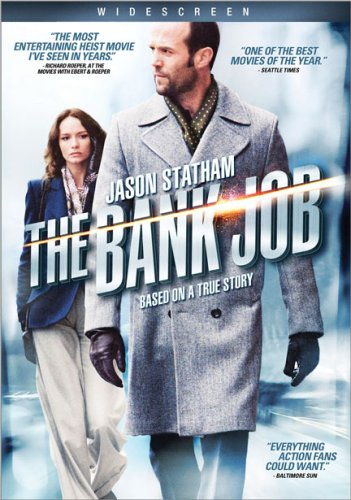

 When Martine approaches Terry with a job offer -- rob a bank while its vault sensors are out of commission -- it sounds too good to be true. And it is too good to be true, but Terry agrees.
When Martine approaches Terry with a job offer -- rob a bank while its vault sensors are out of commission -- it sounds too good to be true. And it is too good to be true, but Terry agrees.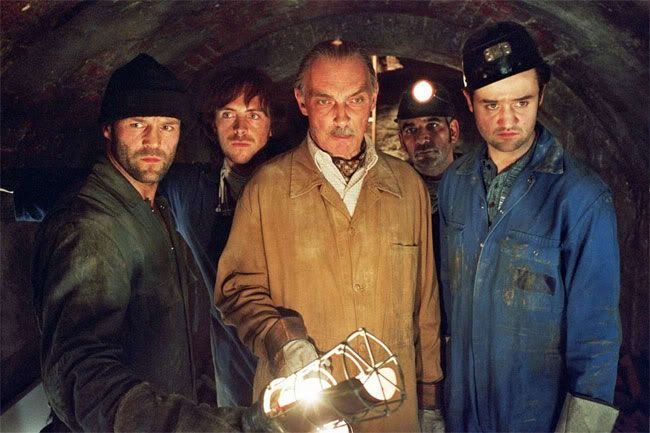 The Bank Job can be contrasted with the 2007 Flawless. Both are heist films. Both are set in London in earlier eras. Both have two main stars. But that is where the comparisons end. Flawless has better stars, with Michael Caine and Demi Moore. Even with Moore's stiff acting, Flawless is the better acted and better developed movie. Indeed, Flawless develops intrigue and maintains interest without resorting to nudity, sex or violence. Neither film is great, but The Bank Job should remain out of sight in a bank deposit box while Flawless deserves a viewing opportunity.
The Bank Job can be contrasted with the 2007 Flawless. Both are heist films. Both are set in London in earlier eras. Both have two main stars. But that is where the comparisons end. Flawless has better stars, with Michael Caine and Demi Moore. Even with Moore's stiff acting, Flawless is the better acted and better developed movie. Indeed, Flawless develops intrigue and maintains interest without resorting to nudity, sex or violence. Neither film is great, but The Bank Job should remain out of sight in a bank deposit box while Flawless deserves a viewing opportunity.


 Meeting a beautiful young woman, Christine (played by Deborah Unger), and following enigmatic notes, The Game feels almost Hitchockian. With a score that plays to the mysterious mood, the tension mounts as surprise follows surprise for Van Orton. Until the very end, the movie maintains interest, keeping the suspense heightened.
Meeting a beautiful young woman, Christine (played by Deborah Unger), and following enigmatic notes, The Game feels almost Hitchockian. With a score that plays to the mysterious mood, the tension mounts as surprise follows surprise for Van Orton. Until the very end, the movie maintains interest, keeping the suspense heightened. At its heart, The Game raises two key ethical issues for consideration. First, who is in control of your life? Nicolas Van Orton despised surprises. He was rich enough to think he had complete control of his life. Surprise, even spontaneity, was an unwanted bedfellow. Are we like Nicolas? (I must confess, I am often this way.) If we are in control, where does that leave God, even the sovereign God? In many places in the Bible, God makes it clear that it is He, not us, who resides on the throne. Two examples, one from the Old Testament and one from the New, will suffice: "Many are the plans in a man's heart, but it is the LORD's purpose that prevails," (Prov 19:21); and "Why, you do not even know what will happen tomorrow" (James 4:14). To want control so badly is to demonstrate a heart and life not fully committed to the Lord.
At its heart, The Game raises two key ethical issues for consideration. First, who is in control of your life? Nicolas Van Orton despised surprises. He was rich enough to think he had complete control of his life. Surprise, even spontaneity, was an unwanted bedfellow. Are we like Nicolas? (I must confess, I am often this way.) If we are in control, where does that leave God, even the sovereign God? In many places in the Bible, God makes it clear that it is He, not us, who resides on the throne. Two examples, one from the Old Testament and one from the New, will suffice: "Many are the plans in a man's heart, but it is the LORD's purpose that prevails," (Prov 19:21); and "Why, you do not even know what will happen tomorrow" (James 4:14). To want control so badly is to demonstrate a heart and life not fully committed to the Lord.

 This is the first Batman film lacking his name in the title, and perhaps it communicates that this is no ordinary Batman movie. And as Batman, Christian Bale is no ordinary Batman. Indeed, he is head and shoulders above the rest. He gives a strong performance. But the acting honors go to the late Heath Ledger in a career-defining performance as the Joker. He steals every scene he is in. Wearing face-paint to cover his character's scars, his lip-smacking performance is scary crazy. This is not Jack Nicholson's Joker, a funny joking criminal. This is an anarchist, a twisted evil man, who terrifies. This is a performance that should earn him a posthumous Oscar nomination, perhaps even the trophy. He could be the first actor to win an Oscar posthumously since Peter Finch in Network back in 1976.
This is the first Batman film lacking his name in the title, and perhaps it communicates that this is no ordinary Batman movie. And as Batman, Christian Bale is no ordinary Batman. Indeed, he is head and shoulders above the rest. He gives a strong performance. But the acting honors go to the late Heath Ledger in a career-defining performance as the Joker. He steals every scene he is in. Wearing face-paint to cover his character's scars, his lip-smacking performance is scary crazy. This is not Jack Nicholson's Joker, a funny joking criminal. This is an anarchist, a twisted evil man, who terrifies. This is a performance that should earn him a posthumous Oscar nomination, perhaps even the trophy. He could be the first actor to win an Oscar posthumously since Peter Finch in Network back in 1976. In The Dark Knight Gotham has a new DA, Harvey Dent (Aaron Eckhart), who is at odds with Police Chief Gordon (Gary Oldman). Corruption in the police is rife, but Dent knows it and is not afraid. He is the hope of the city, its white knight. And his damsel is Rachel Dawes, Bruce Wayne's dream but not-to-be girlfriend. Played with charm and spunk by Maggie Gyllenhaal, she replaces Katie Holmes who soullessly filled these same shoes in Batman Begins.
In The Dark Knight Gotham has a new DA, Harvey Dent (Aaron Eckhart), who is at odds with Police Chief Gordon (Gary Oldman). Corruption in the police is rife, but Dent knows it and is not afraid. He is the hope of the city, its white knight. And his damsel is Rachel Dawes, Bruce Wayne's dream but not-to-be girlfriend. Played with charm and spunk by Maggie Gyllenhaal, she replaces Katie Holmes who soullessly filled these same shoes in Batman Begins. nce again, Fox is the creator of some fabulous techno-toys, including a bat-bike and a bat-suit that lets Batman turn his head. With a new costume and gadgets on hand, this is an action-packed thriller, with a first-rate cast. There are some outstanding stunts, such as when Batman "flies" out of a high-rise office. And there are some terrific action sequences, including the incredible chase where the Joker ultimately gets captured.
nce again, Fox is the creator of some fabulous techno-toys, including a bat-bike and a bat-suit that lets Batman turn his head. With a new costume and gadgets on hand, this is an action-packed thriller, with a first-rate cast. There are some outstanding stunts, such as when Batman "flies" out of a high-rise office. And there are some terrific action sequences, including the incredible chase where the Joker ultimately gets captured. As Gordon exits the interrogation cell, Batman symbolically comes out of the shadows. He pulls no punches in his questioning of the Joker. To get an answer, Batman will stop at nothing . . . except the violation of his one rule. He will not be pulled down to the Joker's level of a world without rules.
As Gordon exits the interrogation cell, Batman symbolically comes out of the shadows. He pulls no punches in his questioning of the Joker. To get an answer, Batman will stop at nothing . . . except the violation of his one rule. He will not be pulled down to the Joker's level of a world without rules. 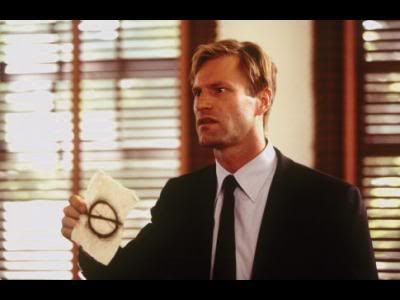 And that is one of the themes of the movie: fairness vs chaos, fairness vs chance. Is chance fair? As a parent, I often hear the words, "It's not fair." So fairness is something that rings true in the heart of all people. Fair means to be free from bias, dishonesty, or injustice. Chance is the absence of any cause of events that can be predicted, understood, or controlled. On the flip side, chaos is a state of utter confusion or disorder; a total lack of organization or order. So, in a sense, both the Joker and Two Face are correct in that chance and chaos are both fair. Perhaps it is better said in the negative: neither are unfair, since neither involve bias. However, chaos caused with a criminal intent is unjust and hence unfair. Similarly, chance that is controlled, as when a coin flip is repeated to get the desired result, is unfair.
And that is one of the themes of the movie: fairness vs chaos, fairness vs chance. Is chance fair? As a parent, I often hear the words, "It's not fair." So fairness is something that rings true in the heart of all people. Fair means to be free from bias, dishonesty, or injustice. Chance is the absence of any cause of events that can be predicted, understood, or controlled. On the flip side, chaos is a state of utter confusion or disorder; a total lack of organization or order. So, in a sense, both the Joker and Two Face are correct in that chance and chaos are both fair. Perhaps it is better said in the negative: neither are unfair, since neither involve bias. However, chaos caused with a criminal intent is unjust and hence unfair. Similarly, chance that is controlled, as when a coin flip is repeated to get the desired result, is unfair. When Batman finally faces off with the Joker in the first climax, it is clear that things have changed, forever. Batman cannot go back to being who he was. The "insanity" of the Joker and the "righteousness" of Batman are both tainted; neither are pure. There is no black and white, only shades of gray, just like in real life. In some warped sense, the Joker is the dark side of Batman. As he says to Batman, "you complete me."
When Batman finally faces off with the Joker in the first climax, it is clear that things have changed, forever. Batman cannot go back to being who he was. The "insanity" of the Joker and the "righteousness" of Batman are both tainted; neither are pure. There is no black and white, only shades of gray, just like in real life. In some warped sense, the Joker is the dark side of Batman. As he says to Batman, "you complete me."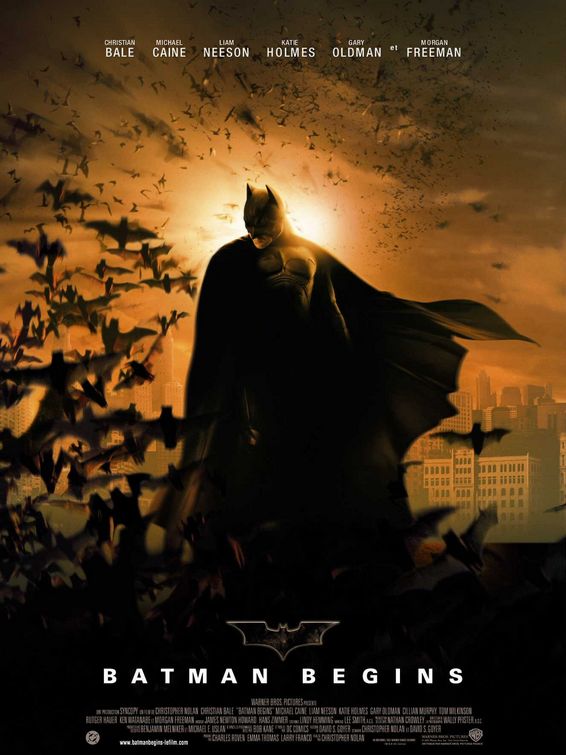
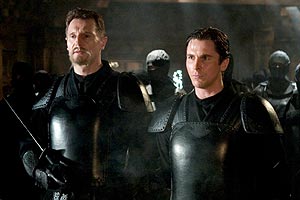 First, Bruce has to learn the difference between justice and revenge. On the one hand, Henri Ducard (Liam Neeson) tells Bruce that justice is balance: an eye-for-eye and tooth-for-tooth. Ducard burns down Wayne Manor because Bruce had burned down Ducard’s house. “Consider us even,” says Ducard. According to Ducard, justice and revenge are one and the same. On the other hand, Bruce's girlfriend, Rachel Dawes (Katie Holmes), responds very pointedly to Bruce when he says he wanted to kill the man who murdered his parents because they deserved justice. Rachel says that there is a difference between justice and revenge: “Justice is about harmony,” whereas “revenge is about making yourself feel better.” In the end, Bruce rejects Ducard’s definition of justice and tells Rachel she was right: “Justice is about more than revenge."
First, Bruce has to learn the difference between justice and revenge. On the one hand, Henri Ducard (Liam Neeson) tells Bruce that justice is balance: an eye-for-eye and tooth-for-tooth. Ducard burns down Wayne Manor because Bruce had burned down Ducard’s house. “Consider us even,” says Ducard. According to Ducard, justice and revenge are one and the same. On the other hand, Bruce's girlfriend, Rachel Dawes (Katie Holmes), responds very pointedly to Bruce when he says he wanted to kill the man who murdered his parents because they deserved justice. Rachel says that there is a difference between justice and revenge: “Justice is about harmony,” whereas “revenge is about making yourself feel better.” In the end, Bruce rejects Ducard’s definition of justice and tells Rachel she was right: “Justice is about more than revenge." Next, Bruce Wayne must learn how to handle fear; he must overcome his fear of criminals, those who use fear as a weapon. Mafia don Carmone Falconi (Tom Wilkinson) says that the power of fear is the kind of power money can’t buy. Twice Bruce tells Falconi he is not afraid of him. Falconi tells Bruce he doesn’t understand the criminal world and “you always fear what you don’t understand.” So Bruce goes 1,000 miles away where nobody knows his name and lives as a criminal in order to better understand that world so that he won’t be afraid of it. Additionally, Ducard plans on using fear as a weapon to destroy Gotham. He plans to disperse a weaponized hallucionogenic which will strike fear into people so they kill each other.
Next, Bruce Wayne must learn how to handle fear; he must overcome his fear of criminals, those who use fear as a weapon. Mafia don Carmone Falconi (Tom Wilkinson) says that the power of fear is the kind of power money can’t buy. Twice Bruce tells Falconi he is not afraid of him. Falconi tells Bruce he doesn’t understand the criminal world and “you always fear what you don’t understand.” So Bruce goes 1,000 miles away where nobody knows his name and lives as a criminal in order to better understand that world so that he won’t be afraid of it. Additionally, Ducard plans on using fear as a weapon to destroy Gotham. He plans to disperse a weaponized hallucionogenic which will strike fear into people so they kill each other.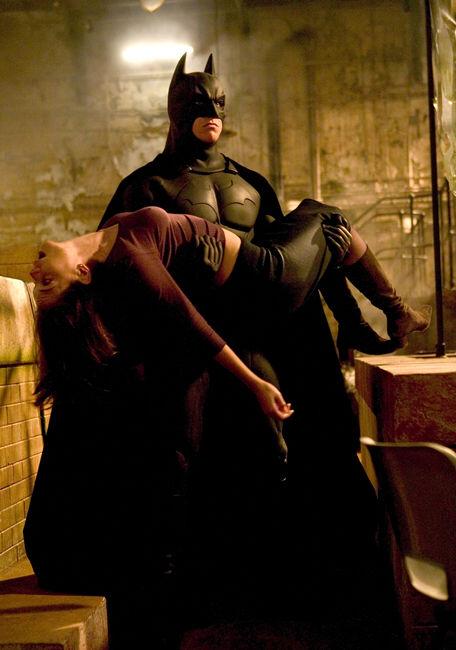 The next lesson Bruce Wayne must learn is the proper means of administering justice. Ducard presents a murderer to Bruce, saying he deserves to die. According to Ducard, only the administration of the death penalty will prove Bruce’s commitment to justice. He must be willing to do whatever is necessary, be willing to kill. The only issue is whether the person is willing to act. Ducard tells Bruce his dad died because he wasn’t willing to kill his attacker. Bruce however is no executioner. He refuses to be the one who deals punishment. He defers to the proper officials, always leaving criminals for the police to find. Thus, he refuses to kill the man accused of murder. In fact, Batman is known for his unwillingness to intentionally kill. Ducard sees this as compassion, which is a weakness he says, “your enemies won’t share.” Ducard believes that there are those without decency who must be fought without hesitation and without pity. However, Bruce sees this ‘compassion’ as the one thing that separates him from the criminals. At the climax of the movie, Ducard asks Bruce if he had finally learned to do what is necessary, the will to kill. But Batman responds that while he won’t kill Ducard he doesn’t have to save him either. It is this ‘one rule’ of Batman’s that will be put to the ultimate test by the Joker in The Dark Knight.
The next lesson Bruce Wayne must learn is the proper means of administering justice. Ducard presents a murderer to Bruce, saying he deserves to die. According to Ducard, only the administration of the death penalty will prove Bruce’s commitment to justice. He must be willing to do whatever is necessary, be willing to kill. The only issue is whether the person is willing to act. Ducard tells Bruce his dad died because he wasn’t willing to kill his attacker. Bruce however is no executioner. He refuses to be the one who deals punishment. He defers to the proper officials, always leaving criminals for the police to find. Thus, he refuses to kill the man accused of murder. In fact, Batman is known for his unwillingness to intentionally kill. Ducard sees this as compassion, which is a weakness he says, “your enemies won’t share.” Ducard believes that there are those without decency who must be fought without hesitation and without pity. However, Bruce sees this ‘compassion’ as the one thing that separates him from the criminals. At the climax of the movie, Ducard asks Bruce if he had finally learned to do what is necessary, the will to kill. But Batman responds that while he won’t kill Ducard he doesn’t have to save him either. It is this ‘one rule’ of Batman’s that will be put to the ultimate test by the Joker in The Dark Knight.

 When Ben is the only student in class who can answer the questions posed by math prof Mickey Rosa (Kevin Spacey), he captures his attention. Later, he is invited to join a small group of students being primed by Rosa to work a system for counting cards for blackjack. At first he refuses; he doesn't want to compromise his job or studies, or even his participation on the robot competition with his two nerdy friends. But a visit from Jill (Kate Bosworth), the hot student he desires from afar, changes his mind.
When Ben is the only student in class who can answer the questions posed by math prof Mickey Rosa (Kevin Spacey), he captures his attention. Later, he is invited to join a small group of students being primed by Rosa to work a system for counting cards for blackjack. At first he refuses; he doesn't want to compromise his job or studies, or even his participation on the robot competition with his two nerdy friends. But a visit from Jill (Kate Bosworth), the hot student he desires from afar, changes his mind. At first Ben, with his new identity, does well but remains the same shy scholarly student that he was at first. He still wants to stay friends with his nerdy buddies. But as these trips continue, he changes. He is seduced by the large amounts of money they are winning, the glitz of the neon, the grand suites they occupy, and the recognition he is given by the hotel staff. Slowly he withdraws from his former friends. He lies to his mother. He becomes a different person, an uncaring, high roller who lives for the thrill of the game, and enjoys the trappings of this success.
At first Ben, with his new identity, does well but remains the same shy scholarly student that he was at first. He still wants to stay friends with his nerdy buddies. But as these trips continue, he changes. He is seduced by the large amounts of money they are winning, the glitz of the neon, the grand suites they occupy, and the recognition he is given by the hotel staff. Slowly he withdraws from his former friends. He lies to his mother. He becomes a different person, an uncaring, high roller who lives for the thrill of the game, and enjoys the trappings of this success. When Ben and his fellow students decide to work without Rosa, he gives them away to casino enforcer Cole Williams (Laurence Fishburne), a shady character from Rosa's past. When Ben is taken for a talk with Williams, the talk involves fists and knuckle-rings. It is a wake-up call.
When Ben and his fellow students decide to work without Rosa, he gives them away to casino enforcer Cole Williams (Laurence Fishburne), a shady character from Rosa's past. When Ben is taken for a talk with Williams, the talk involves fists and knuckle-rings. It is a wake-up call. 21 wastes its talent. The signals used in the casinos are so obvious a blind-man could spot them a mile away. The system, explained once, is repeated time and time again unnecessarily, as though the director expects us to forget what is going on. And the characters are too superficial, almost caricatures. The screenplay lacks subtlety; with more depth of character it would have been interesting and compelling.
21 wastes its talent. The signals used in the casinos are so obvious a blind-man could spot them a mile away. The system, explained once, is repeated time and time again unnecessarily, as though the director expects us to forget what is going on. And the characters are too superficial, almost caricatures. The screenplay lacks subtlety; with more depth of character it would have been interesting and compelling.

 Present at this first meeting is reporter Paul Avery (Robert Downey Jr) and Robert Graysmith (Jake Gyllenhaal), a cartoonist who is in the right place at the right time to be in on this first code. Avery is sent to do investigative reporting, while Graysmith is dismissed to work on his comics.
Present at this first meeting is reporter Paul Avery (Robert Downey Jr) and Robert Graysmith (Jake Gyllenhaal), a cartoonist who is in the right place at the right time to be in on this first code. Avery is sent to do investigative reporting, while Graysmith is dismissed to work on his comics. detail, catches the ambience of the times, even giving subtle references. The real-life Toschi was the inspiration for Steve McQueen's performance in Bullitt (1968) and in one-scene is sarcastically called Bullitt. In another, Graysmith is in a movie theater watching Dirty Harry, which was set in San Francisco with Inspector Dirty Harry Callahan on the trail of a serial-killer, Serpico -- modeled after Zodiac.
detail, catches the ambience of the times, even giving subtle references. The real-life Toschi was the inspiration for Steve McQueen's performance in Bullitt (1968) and in one-scene is sarcastically called Bullitt. In another, Graysmith is in a movie theater watching Dirty Harry, which was set in San Francisco with Inspector Dirty Harry Callahan on the trail of a serial-killer, Serpico -- modeled after Zodiac. Robert Graysmith, though, suffers the most. He started as a serious cartoonist, one with a loving relationship with his kids. Once the Zodiac got in his blood he could think of nothing else. Even his second wife, Melanie (Chloë Sevigny), left him. The obsession was plain for her to see even on their first date. He arrives late, asks her to spend time with him in a phone booth as he tries to contact Avery, worried that he may be walking into a trap set by the Zodiac, and then has her spend a long lonely night as they together wait for Avery's return call.
Robert Graysmith, though, suffers the most. He started as a serious cartoonist, one with a loving relationship with his kids. Once the Zodiac got in his blood he could think of nothing else. Even his second wife, Melanie (Chloë Sevigny), left him. The obsession was plain for her to see even on their first date. He arrives late, asks her to spend time with him in a phone booth as he tries to contact Avery, worried that he may be walking into a trap set by the Zodiac, and then has her spend a long lonely night as they together wait for Avery's return call. As his obsession continues, he withdraws from Melanie and involves his three kids in his compulsive pursuit of the killer. His character disintegrates and he appears dishevilled. When asked what is driving him, he can only say, "I... I Need to know who he is. I... I need to stand there, I need to look him in the eye and I need to know that it's him." As the movie's tagline says, "There's more than one way to lose your life to a killer" and Graysmith is most certainly losing his life, maybe his sanity, to someone he does not know but needs to find. This puzzle has control over him.
As his obsession continues, he withdraws from Melanie and involves his three kids in his compulsive pursuit of the killer. His character disintegrates and he appears dishevilled. When asked what is driving him, he can only say, "I... I Need to know who he is. I... I need to stand there, I need to look him in the eye and I need to know that it's him." As the movie's tagline says, "There's more than one way to lose your life to a killer" and Graysmith is most certainly losing his life, maybe his sanity, to someone he does not know but needs to find. This puzzle has control over him.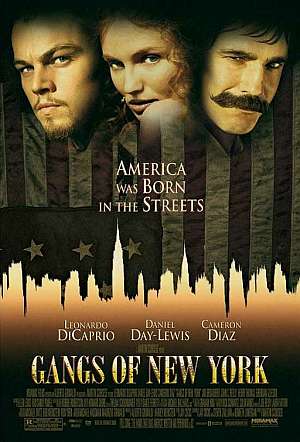

 Some years later, Amsterdam returns to the 5 Points as a young man (Leonardo DiCaprio) whose "education" has been in a brutal reform school. He is filled with hatred for Bill and is looking for revenge. As he falls in with a group of Irish boys, he manages to meet Bill and somehow gain his approval, becoming almost an apprentice of his. As side-kick, he is "sleeping with the enemy" who does not know his true identity. Along the way, he meets, befriends and falls in love with Jenny (Cameron Diaz), a street-wise but scarred pick-pocket.
Some years later, Amsterdam returns to the 5 Points as a young man (Leonardo DiCaprio) whose "education" has been in a brutal reform school. He is filled with hatred for Bill and is looking for revenge. As he falls in with a group of Irish boys, he manages to meet Bill and somehow gain his approval, becoming almost an apprentice of his. As side-kick, he is "sleeping with the enemy" who does not know his true identity. Along the way, he meets, befriends and falls in love with Jenny (Cameron Diaz), a street-wise but scarred pick-pocket. Prejudice is a key theme throughout this movie, as it takes the form of national prejudice (Americans vs immigrants) as well as racial prejudice (whites vs blacks). The gangs of New York are formed to provide protection for the groups of people who naturally gravitate together. As Irishman McGinn (Brendan Gleeson) says, " That war [of prejudice] is a thousand years old and more. We never expected it to follow us here. It didn't. It was waiting for us when we landed." Prejudice is inescapable.
Prejudice is a key theme throughout this movie, as it takes the form of national prejudice (Americans vs immigrants) as well as racial prejudice (whites vs blacks). The gangs of New York are formed to provide protection for the groups of people who naturally gravitate together. As Irishman McGinn (Brendan Gleeson) says, " That war [of prejudice] is a thousand years old and more. We never expected it to follow us here. It didn't. It was waiting for us when we landed." Prejudice is inescapable.![[GangsOfNewYork_104.jpg]](https://blogger.googleusercontent.com/img/b/R29vZ2xl/AVvXsEhXDJXmUXjMzbyvPqRYQobwmKPj-zdoG7wIDTpmdPqrgjHa6FHzgK8PYDPD6PN5_pNV09llQTtRL81R31oqF-h5gUspCaQAVGlHPuGTpeFOoqwpuyCQf5XKnopYpnWMea0NQOgrLQu1F5U/s1600/GangsOfNewYork_104.jpg) Despite the immigrants who sign-up, there is still a lack of numbers and the draft is enacted. Only the rich can escape, since a conscript could buy his way out of the army for a price of $300. But it is a price that most could not afford. When the draft becomes real and names are drawn, the tinder-box of New York is sparked and anti-draft riots occur. Amidst the worst riots in the nation's history, the mob torches the town, killing anyone who stood in its way.
Despite the immigrants who sign-up, there is still a lack of numbers and the draft is enacted. Only the rich can escape, since a conscript could buy his way out of the army for a price of $300. But it is a price that most could not afford. When the draft becomes real and names are drawn, the tinder-box of New York is sparked and anti-draft riots occur. Amidst the worst riots in the nation's history, the mob torches the town, killing anyone who stood in its way. Gangs of New York is a powerful film with strong acting. Daniel Day-Lewis is larger than life in the central role of Bill the Butcher that sees him have a scene with every main character in the movie. Having won one Oscar for his role in
Gangs of New York is a powerful film with strong acting. Daniel Day-Lewis is larger than life in the central role of Bill the Butcher that sees him have a scene with every main character in the movie. Having won one Oscar for his role in  But Gangs of New York is not perfect. It is overlong, with too many characters and too graphic in its violence. More than this, its answer to its fundamental question is that revenge and hatred will sustain a man, which is deeply unsatisfying ethically. Revenge is costly. It is an emotion that does not sustain life, it sucks the life and the love out of a person, turning them into a bitter shell.
But Gangs of New York is not perfect. It is overlong, with too many characters and too graphic in its violence. More than this, its answer to its fundamental question is that revenge and hatred will sustain a man, which is deeply unsatisfying ethically. Revenge is costly. It is an emotion that does not sustain life, it sucks the life and the love out of a person, turning them into a bitter shell. 

 liberal arts and literature were crushed and destroyed by Wetherhold's scathing criticism of her papers. When she tells him he cannot drive for 6 months due to his condition, both find themself in a quandary. He needs a driver, and she has a forgotten crush rekindled.
liberal arts and literature were crushed and destroyed by Wetherhold's scathing criticism of her papers. When she tells him he cannot drive for 6 months due to his condition, both find themself in a quandary. He needs a driver, and she has a forgotten crush rekindled. Of all the characters in Smart People, Chuck is easily the most likable, if perhaps the most depraved. But he is comfortable with his depravity and his dumbness. He is not putting on airs. What you see is what you get with him. In contrast, Lawrence is self-absorbed and narcissistic. He is only focused on his latest book, which has been consistently rejected by one publisher after one another. When he finally goes on a first date with Janet, he spends 45 minutes talking about himself without pausing to let her say a single word. What did she see in him? And she is no cuddle-bunny. She is a man-eater who has poisoned her earlier relationships: a match made in heaven! (Yet the viewer is left asking what she ever saw, or even still sees, in him.)
Of all the characters in Smart People, Chuck is easily the most likable, if perhaps the most depraved. But he is comfortable with his depravity and his dumbness. He is not putting on airs. What you see is what you get with him. In contrast, Lawrence is self-absorbed and narcissistic. He is only focused on his latest book, which has been consistently rejected by one publisher after one another. When he finally goes on a first date with Janet, he spends 45 minutes talking about himself without pausing to let her say a single word. What did she see in him? And she is no cuddle-bunny. She is a man-eater who has poisoned her earlier relationships: a match made in heaven! (Yet the viewer is left asking what she ever saw, or even still sees, in him.) Smart People pictures these two very smart people as so smart and intellectual that they miss the emotional and romantic intelligence or niceties needed to maintain or even begin a relationship. They have no clue. It takes dumb Chuck to show them, and Vanessa, what life and love is all about.
Smart People pictures these two very smart people as so smart and intellectual that they miss the emotional and romantic intelligence or niceties needed to maintain or even begin a relationship. They have no clue. It takes dumb Chuck to show them, and Vanessa, what life and love is all about.

 wife believes "love is sex" and wants sex not romance or affection, while Harry seems to want affection more than sex. Harry is a good guy who "cares" enough about his wife to avoid hurting her with a divorce, so decides he will poison her instead . . . as if killing her is a better thing for her.
wife believes "love is sex" and wants sex not romance or affection, while Harry seems to want affection more than sex. Harry is a good guy who "cares" enough about his wife to avoid hurting her with a divorce, so decides he will poison her instead . . . as if killing her is a better thing for her. With such a quality cast, Married Life gets fine performances from the lead actors. Yet, despite the acting and the interesting plot twists (a "good" guy with a bad heart and a "bad" guy who develops a better heart, no longer wanting to play loose with every woman he meets), this is a melodrama that disappoints. The characters are not that likeable, and it is hard to care about them.
With such a quality cast, Married Life gets fine performances from the lead actors. Yet, despite the acting and the interesting plot twists (a "good" guy with a bad heart and a "bad" guy who develops a better heart, no longer wanting to play loose with every woman he meets), this is a melodrama that disappoints. The characters are not that likeable, and it is hard to care about them. At one point Pat says "What is the price a good wife pays?" She wants to be good but does not wish to pay the price. She is focused on self-interest, in this case in sex and not from her husband. He, in turn, realizes that she has made him a "better finished product" but cannot bear to publicly humiliate her (as divorce did in those days when it was not common).
At one point Pat says "What is the price a good wife pays?" She wants to be good but does not wish to pay the price. She is focused on self-interest, in this case in sex and not from her husband. He, in turn, realizes that she has made him a "better finished product" but cannot bear to publicly humiliate her (as divorce did in those days when it was not common).